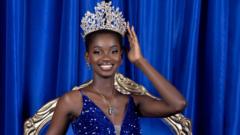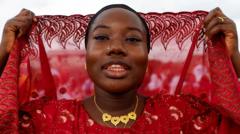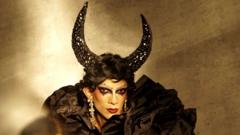The new regulations aiming to redefine beauty norms in Ivory Coast’s beauty pageants incite discussion about identity, self-expression, and the deeper implications for a society historically influenced by Western ideals.
New Beauty Pageant Rules Celebrate Natural Hair in Ivory Coast

New Beauty Pageant Rules Celebrate Natural Hair in Ivory Coast
A groundbreaking shift in beauty standards emerges as Miss Ivory Coast bans wigs and weaves to promote natural beauty.
In a notable transformation for beauty standards, the Miss Ivory Coast pageant has officially banned wigs and weaves from its preliminary competitions, encouraging contestants to embrace their natural hair. This decision comes amidst a growing trend worldwide that favors natural beauty over artificial enhancements. Marlène-Kany Kouassi, crowned Miss Ivory Coast in 2022, notably distinguished herself as one of only two winners in six decades to wear her crown with natural hair, highlighting a shift toward inclusivity and self-acceptance.
Victor Yapobi, president of the Miss Ivory Coast organizing committee, emphasized that the focus of the competition is to showcase the "raw beauty" of participants. This paradigm shift prohibits not only wigs but also encourages contestants with different hairstyles, urging a departure from the longstanding preference for extended locks and noted for promoting more natural aesthetics, as cosmetic surgeries are also prohibited.
The implications of these new regulations extend beyond mere vanity, as they empower participants to redefine their aesthetic standards and reclaim their identities as African women. Contestants like Emmanuella Dali, 21, articulated that the absence of wigs allows for a deeper sense of pride and authenticity; meanwhile, the ruling has sparked diverse reactions among contestants.
Some lament the loss of personal expression typically afforded by wigs while others, like Laetitia Mouroufie, have re-evaluated their preconceptions of beauty. The discourse surrounding hair echoes a broader conversation on societal beauty standards, with experts noting that while the natural hair movement is gaining traction, it remains overshadowed by a thriving wig industry that generates over $300 million annually in Ivory Coast alone.
Professional hairstylists express concerns that the decision could gravely impact their businesses, as many women prefer the versatility and aesthetic appeal of wigs, perceiving them as a form of creative expression. However, this new regulation also highlights the increasing accessibility of natural hair products and the rise of influencers advocating for the natural movement on social media.
As pageant preliminary rounds progress, the resulting discussions about normative beauty ideals and whether they should dictate societal trends continue, providing a fertile ground for change. Feedback regarding these rules has been overwhelmingly positive, suggesting a potential cultural shift towards more acceptance of diverse beauty forms.
Looking ahead, the decision about whether the wig ban will extend to the final Miss Ivory Coast 2025 contestants remains uncertain, as officials plan the televised spectacle scheduled for June. The evolving landscape of the pageant reflects a critical intersection of tradition and modernity, leaving many hopeful that this new direction will foster greater self-acceptance among women across the region.
In summation, this change heralds a new chapter in beauty contests and may potentially influence a broader cultural reconsideration of hair and beauty standards in Ivory Coast and beyond, promoting a more inclusive narrative around natural beauty.
Victor Yapobi, president of the Miss Ivory Coast organizing committee, emphasized that the focus of the competition is to showcase the "raw beauty" of participants. This paradigm shift prohibits not only wigs but also encourages contestants with different hairstyles, urging a departure from the longstanding preference for extended locks and noted for promoting more natural aesthetics, as cosmetic surgeries are also prohibited.
The implications of these new regulations extend beyond mere vanity, as they empower participants to redefine their aesthetic standards and reclaim their identities as African women. Contestants like Emmanuella Dali, 21, articulated that the absence of wigs allows for a deeper sense of pride and authenticity; meanwhile, the ruling has sparked diverse reactions among contestants.
Some lament the loss of personal expression typically afforded by wigs while others, like Laetitia Mouroufie, have re-evaluated their preconceptions of beauty. The discourse surrounding hair echoes a broader conversation on societal beauty standards, with experts noting that while the natural hair movement is gaining traction, it remains overshadowed by a thriving wig industry that generates over $300 million annually in Ivory Coast alone.
Professional hairstylists express concerns that the decision could gravely impact their businesses, as many women prefer the versatility and aesthetic appeal of wigs, perceiving them as a form of creative expression. However, this new regulation also highlights the increasing accessibility of natural hair products and the rise of influencers advocating for the natural movement on social media.
As pageant preliminary rounds progress, the resulting discussions about normative beauty ideals and whether they should dictate societal trends continue, providing a fertile ground for change. Feedback regarding these rules has been overwhelmingly positive, suggesting a potential cultural shift towards more acceptance of diverse beauty forms.
Looking ahead, the decision about whether the wig ban will extend to the final Miss Ivory Coast 2025 contestants remains uncertain, as officials plan the televised spectacle scheduled for June. The evolving landscape of the pageant reflects a critical intersection of tradition and modernity, leaving many hopeful that this new direction will foster greater self-acceptance among women across the region.
In summation, this change heralds a new chapter in beauty contests and may potentially influence a broader cultural reconsideration of hair and beauty standards in Ivory Coast and beyond, promoting a more inclusive narrative around natural beauty.


















